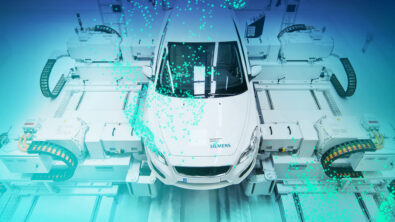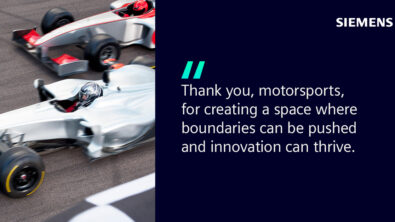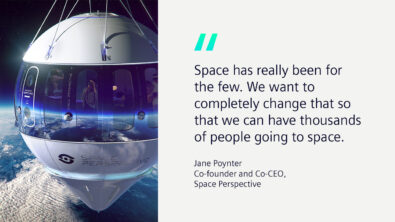Carlo Mondavi’s Autonomous Electric Tractors for Sustainable, Affordable Farming – Part 2
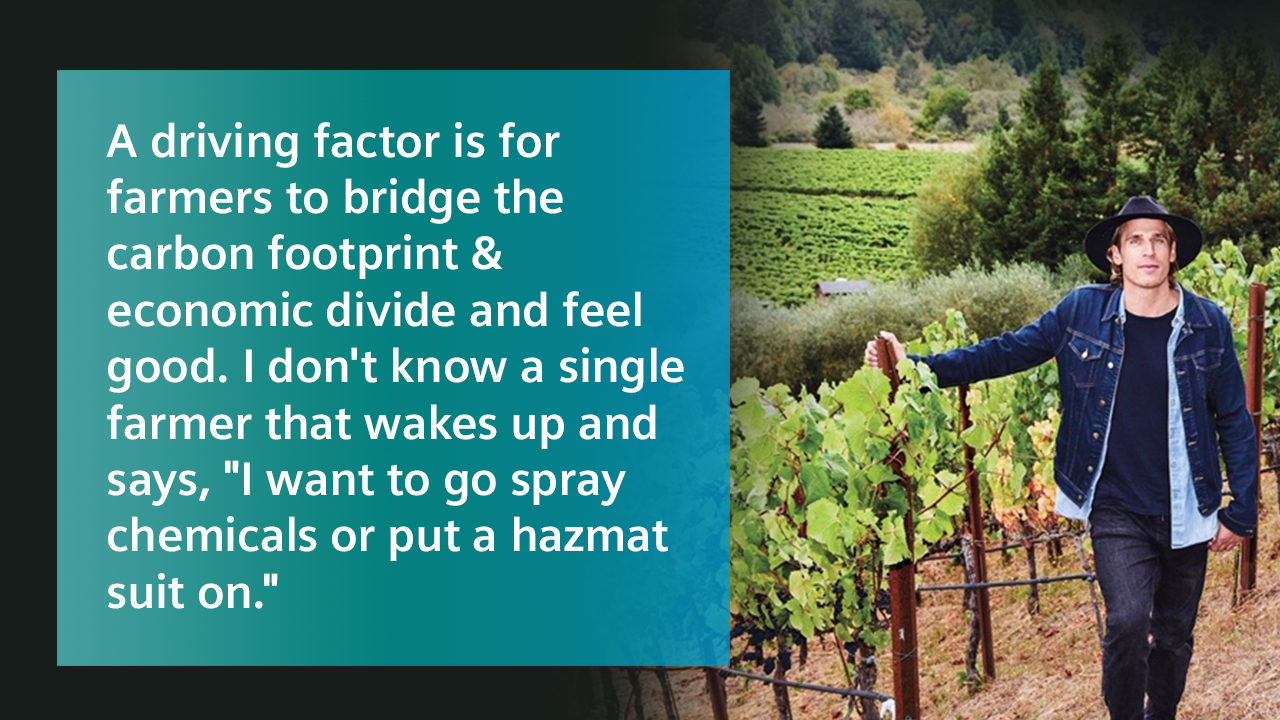
Autonomous tractors, AI & wine making in year 2040
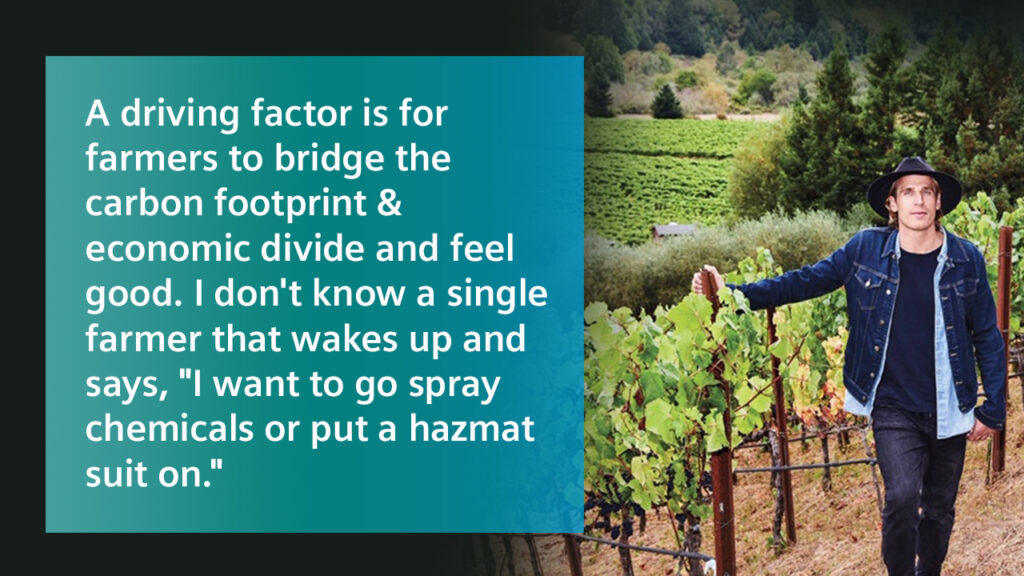
Sustainability will play a major role in shaping the future of farming!
The biggest changes that have to be made to create sustainable farms are the farm input and the machines utilized. Companies in this industry are leveraging technology to come up with ways of making the above changes while still being mindful of the farm produce quality.
So far, it is working! The current technological advancements are making farming cheaper and more friendly to newbie farmers. This is bound to promote the mass adoption of sustainable farming strategies.
In this episode, the second part out of two, Ed Bernardon interviews Carlo Mondavi, grandson of Napa Valley icon Robert Mondavi, and founder/Chief Farming Officer of Monarch Tractor. Carlo is also a farmer and one of the owners of RAEN Winery. We’ll talk about the impact their autonomous tractor is having on the farming industry as well as what the future of farming looks like.
Some Questions I Ask:
- How many tractors can a single operator run? (06:40)
- What’s the role of data analytics in all this and how do you collect it? (08:46)
- Do you foresee a future where AI will play a bigger role? (13:00)
- What do you see as the next two or three steps in farming in the next 5 to 10 years? (21:59)
- How are we going to be making wine in the year 2040? (24:55)
What You’ll Learn in this Episode:
- How Monarch will help in getting rid of chemical use in the farms (03:24)
- How the Monarch tractor removes weed without hurting the vine (05:05)
- Challenges that farmers are facing during the harvest season (07:28)
- How technology is making it easier to become a farmer (16:24)
- Some of the Monarch’s challenge success stories (19:07)
Connect with Carlo Mondavi:
Connect with Ed Bernardon:
Ed Bernardon: An incredible number of advancements have been made over the years in commercial agriculture that makes fresh food more accessible to millions of people. But along with these advancements has come a greater dependence on pesticides and herbicides that end up in everything from the food we eat to our drinking water. Unfortunately the use of organic pesticides and herbicides can be more expensive for farmers especially since they can require more applications. This in turn can have an adverse effect on the carbon footprint of farming due to the increased use of application equipment that adds to CO2 emissions.
In order to find a way around the proliferation of chemicals invading our farms and our food, one farmer has created a shift in technology that reduces the cost and amount of labor that goes into farming while at the same time reducing the carbon footprint. It might even provide a path to eco-freindly farming through what he calls a “Farmer First” universal mentality!
–intro music—
Today, I continue my chat with Carlo Mondavi as he gives me deeper insight on just what goes into the electric and autonomous technology behind the Monarch tractor. We discuss how autonomous farming will evolve over the next 5/10 years and what a winery might be like in the year 2040. Finally in our rapid fire section at the end Carlo reveals a secret that even his mother doesn’t know from his time as a professional snowboarder.
Listen in and hear part two of my conversation with farmer, winemaker and entrepreneur Carlo Mondavi on today’s episode of Future Car.
Ed Bernardon: Let’s talk about the tractor and what it does. And we talked a little bit earlier that it’s really not just about harvesting corn and wheat. But when you’re growing grapes, there are all sorts of things to do like mowing, spraying seeding, pruning, bush-hogging – another term, which is really mowing. Tell us a little bit about what these tasks are, which are the easy ones, which are the hard ones, which is a tractor do now, which will it do in the future?
Carlo Mondavi: The wonderful thing about farming is that each farmer has their own way about going about things. Some people like to till. Like Dante and I don’t till – we’re a no-till farm. Even in the organic regenerative biodynamic realm, it’s like giving chefs a tomato, and you said, “Make a salad out of these ingredients.” You’ll get 10 different salads from 10 different chefs. It’s the same with farming. We love our creative expression and how we farm. So, the thing about Monarch is that it’s able to take the whole entire implement yard. So, on the back, there’s a PTO that spins, that engages the implement, or there’s a hydraulic pump that powers the implement. You have this hitch that you hook up your implements to. And so it can reverse fit into the whole entire employment yard. So, you’re able to go spray, you’re able to mow, you’re able to do all of those things as a driver, or you’re able to do them autonomously and have it go down and do it itself. The hardest thing and the biggest reason I think that I’d say, 40 years, we’ve gone down this rabbit hole. Really, if you look at the Green Revolution – they should be called the Chemical Revolution – that post World War One, World War Two, all of that energy that was going into wartime chemicals pivoted to agricultural chemicals, and we lost our way.
Carlo Mondavi: So the biggest thing is how do we get rid of a lot of these chemicals from the farm. And the one thing that Monarch is, I think, the biggest thing, and this is what is helping solve The Monarch Challenge and deal with is you’re able to get rid of one chemical by 100%. So, you’re not talking about getting rid of like 20% less of this, you’re getting rid of it completely, and that is with herbicides under the vines, and under plants, under trees, under weeds grow. And it’s a harder area to access with an implement. And so, in the last 40 years, all the implements that were meant to go there and deal with that have been traded in for sprayers to go spray herbicides.
Ed Bernardon: You kill all the weeds or whatever might be there rather than try and mechanically deal with it?
Carlo Mondavi: And on a global basis too. We’ve seen herbicides, I really think that it was in the late ‘90s, early 2000s, as it made its way into our food chain system in terms of when corn and soy became GMO Roundup-resistant and glyphosate-resistant if you will. And then it was in like everything from your soda pop to your cereal to your drinking and eating all day long. The biggest thing for Monarch is to get rid of the chemicals by 100%. So, that, I would say, historically has been the hardest job, and we want to make it the most pleasurable and easy job.
Ed Bernardon: Now, how does the tractor actually do that then? By being able to mechanically manage the weed growth?
Carlo Mondavi: You hook up on the back and implement. There are mowers, cultivators, and they engage off the plant. So, it has this arm and as the arm hits the plant, the hydraulic pump pulls it back.
Ed Bernardon: So, you don’t hurt the vine.
Carlo Mondavi: Yeah, exactly. So, you’re getting underneath the vine. And the great thing about it is that you can just get that little strip underneath the vine, and then have a big cover crop in the middle and between the plants, so you can have more biodiversity there.
Ed Bernardon: Now, it’s just an invention of Monarch Tractor, this type of device?
Carlo Mondavi: No, this is an incredible technology that you can find through all sorts of incredible implement companies. We have a partnership with Dondi in Italy, and Clemens in the United States. And they’re actually a German implement company, but incredible technology that’s been around for a while too. It’s just the reason why people typically don’t go down this is because you have to drive your tractor slower, and it takes longer. And so it’s just enough.
Ed Bernardon: And with the autonomous tractor, that doesn’t matter as much because you can have many of them out there for one operator.
Carlo Mondavi: Think of it as almost like a Roomba. You could go very slow and consistently and kind of attack things as you need to without this time constraint on, like, “Wait, I need John to go do this, and I need to go do that, so I can’t actually drive a tractor long enough to do that because I don’t have time today.” So, it frees up time for the farm team.
Ed Bernardon: How many tractors can a single operator run?
Carlo Mondavi: So, six to eight tractors, depending on the farm, and that is like covering a lot of land. That would be a larger winery at scale. Dante and I have one tractor, for example, for Raen, 18.5 acres. My family has six tractors total. So, we could have one person managing all six tractors. But rarely will you see, on our farm, the manager running all six tractors; it will be two tractors or something like that. Bigger farms at scale, the ones that are going to be really benefiting from this, that have 50 tractors operated in a day, that’s when they’re going to see huge opportunities to take steps forward in their farming and also take steps forwards in their profiting from going the right direction, which is exciting.
Ed Bernardon: I would think that some of the operations that you go through in the vineyard, for instance, cutting the grapes off the vine or pruning. Can those be done automatically?
Carlo Mondavi: They definitely can. So, right now, there are machine harvesters, there are machine pruners as well. And I think that that’s all going to continue to get better and better. We’re having a hard time right now getting teams together. My cousins had to call off the pick twice because they couldn’t get the team together this last year. So, it’s becoming harder and harder to get the teams to harvest and COVID has not made it easier because a lot of people are just like, “I’m not going to travel.” In the vineyards and in farming around the world, harvest is typically done by a migratory group. So, I’m in Italy right now, typically, there’s a group that – and it shifts but – for the last 15 years, they’ve been coming from Macedonia, Romania, and California. We have people coming from the South, like Mexico. And when you hear a president, like our previous president saying that he wants to build a wall and all this, people started saying, “Well, Mexico is doing better, the economy’s doing better, maybe I don’t want to go to California and pick.” So, it has become harder and harder to find that crew that needs to swell up to size for harvest.
Ed Bernardon: The tractor, you say, has this trifecta of electrification, automation, and data analysis. We’ve talked a little bit about automation and electrification. How does data analytics play into this? What data are you collecting? What do you do with it? How does it provide benefits?
Carlo Mondavi: There’s so much data that you just don’t even know where to begin with it all – there’s so much data. There’s the opportunity for that within our platform. So, it’s a vision-based stack. So, as a tractor drives down a farm row, it’s visualizing everything. So, a lot of the AI, a lot of the ability for it to get to point A to point B is through vision. And that vision doubles as a significant amount of data. So, being able to see things like the canopy and understand the plant’s moisture levels; being able to see clusters and fruit; and being able to see short shoots versus tall shoots; being able to see from an entomology perspective, different insects and all that. So, you can take all that data. And then what you can do is, essentially, back solve challenges and problems and prevent big outbreaks. Because everything in farming is reactionary. And the key is to how quickly can you react. So, if you see that you have short shoots, but you didn’t see it before and you let it go, that fungal pathogen, whatever it’s passing through, whatever it’s Eutypa or Esca or anything like that. It’s in the plant. It all of a sudden can end up all the way down to the head and you’ve lost that plan entirely. But if you see it earlier, and it creates an alert and sends you an alert saying, “Hey, you have short shoots here, go check it out,” you can look at it, you can then see where it is because there’s a geotag reference of where it is on the vineyard. You can walk right to that vine from this picture that the tractor sent you. And you can say, “Yeah, this is Eska. I’m going to cut this off.” And you can save the plant without having to lose the plant. You can be back into having that be a fruitful plant quicker. It’s infinite but one of the things, the long-term roadmap, that is the ability to deal and address fungicides, herbicides, and pesticides, all three of the chemicals that are used in farming, to be able to get to a completely chemical free farming universe.
Ed Bernardon: I imagine, you have your cameras on your system, and it could look at the shoot growth and say, “Oh shoot growth should have been three inches but it’s only an inch and a half.” Or you see a pest, there are many more here than we expected. We better do something.” Now, is that at this point, more the farmer looking at the camera feeds that you get, or can that be done automatically with artificial intelligence or some other image recognition technology?
Carlo Mondavi: So, right now, before Monarch Tractor, it’s done with people walking in the vineyards and looking, and people trying to trap. They put out these little sticky things that try to trap what’s out there in the field, and then they bring that back and they analyze that from an insect standpoint, from a mildew pressure standpoint, and all that. It’s a lot of just knowing the weather and what could bloom. And that’s one of the challenges because sometimes you’re using something to protect against something that’s not even there. So, if you knew by spore trapping, that there were no spores present, you wouldn’t need a spray at all, for example, from a fungal pathogen standpoint. So, it’s just about data and being able to get that data quick, calculate it, understand it. But right now, all of that’s been done in a manual path. There are things that that we can plug into. here are people taking pictures for it. We’re working with a great company called, that is vine moisture. You can take a picture of the plant, and then it’ll tell you if the canopy is healthy or if it’s maybe malnourished, or if it needs water. There’s just a lot of data just in the canopy that you’re going to get the access of a PhD from UC Davis that can just give you incredible data back to you and say, “Hey, this is what you’re seeing,” versus having to hire that PhD to come out and walk the field with you. So, you’re able to access, take data, access it, put it into the hands of someone who’s incredibly bright and intelligent, and able to then kick that back to the farmer and react to it in a meaningful amount of time.
Ed Bernardon: And there are really two parts to that because you have acres and acres and rows and rows of vineyards. So, as the tractor is crawling through these rows, now you’re getting a very systematic observation of what’s going on, where even humans could never do that on every single plant in every single row. And then, the other side of that, which you just explained is, if we had all this data and we could get experts to look at all of it very quickly, then we’ll know, “Oh, in this section of the vineyard, we’ve got this problem or that problem.” Although now you’re doing it manually, ultimately, would you foresee in the future that you could use AI possibly to make that chain more automatic? In other words, observe what the problem is, bring in expert algorithms, analyze it somehow, and then maybe even make recommendations on what to do.
Carlo Mondavi: Yeah, that’s definitely on the table. And that’s the exciting thing, I think, about what’s happening right now is that on the table right now is the ability to get rid of all fungal pathogens; on the table right now is the ability to get rid of all herbicides; on the table right now is the ability to get rid of all pesticides. So, literally, you can address all chemicals from an AI perspective. And that’s all done through the ability for the tractor to continue to develop intelligence within the field, and then to continue to be able to deliver that intelligence to the farm team. It’s an exciting time. That is a bit of the future. And the other thing is that with the tractor, there are just updates. So, you’re able to update all that and continue to have the current technology and the current ability to access all of those future learnings that we’re able to have on the tractor. So, the platform is a platform for today, but it’s updatable for the future.
Ed Bernardon: And it’s sometimes just a combination of these technologies. One of the things I read was that you could monitor the torque on the mower on the bush hog. So, if too much torque has been required, it means that the grass that you’re cutting you’ve waited a little too long or is growing too fast, which then could tell you, “Oh, maybe we should mow more often.” So, even the simple little sensor like a torque sensor combined with a camera, combined with image recognition. It’s all these pieces together is raising, farming up to a completely new level.
Carlo Mondavi: And that was one of the goals was to have somebody be sitting in a cubicle office somewhere and see what’s happening in farming and say, “Hey, you know what? I want to go farm now. I don’t want to manage stocks or banking or law. I want to go farm because now farming is actually really approachable and really exciting and really interesting.” Farming is hard. It’ll always be tough work and you’ll always be humbled by mother nature. But I think that there’s a mystery of farming. And we’ve lost touch to our roots of farming. I think that’s so important that we get back in touch with our roots of farming. Once upon a time, every family was farming. And now it’s like, very few families are farming. So, how do we get back to that point where we all get a farm again? I think that one of my hopes is that through a technology that’s able to bridge away from fossil fuel and into a lot of intelligence and data and all that, that it becomes less mysterious and more interesting for more people. So, farming is important. Farmers are the most important people on our planet. I mean, without food, we’re not able to survive.
Ed Bernardon: You talk about the approachability of farming. And certainly, one way of gaining that approachability would be to have a grandfather like you had. But very, very few people have that opportunity. And now, what you’re saying is, you’re never going to replace Robert Mondavi or a grandfather who knows farming with AI or any technology. But you can make that step a little bit easier. It’s not something that you immediately think autonomous and EV technology are going to do. Certainly, there’s everything you’ve been talking about sustainability, but I never would have thought, “Oh, wow, if you do gather all this data, and you can analyze it, and you can have the experts out there at your fingertips. Well, maybe even I could do this.”
Carlo Mondavi: And then also be in an area and move to farming communities. You might be a little bit worried to move to a community that you’re worried that they’re not farming in a high level and that ends up in the water table and all that. And the truth of the matter is that up for the last 25-30 years, it’s been going in the wrong direction. Even though our knowledge of it being dangerous, it was just economically unsustainable for farms to go down the right path. And so even in areas where there’s the margin that we have in wine, there was people that I respect and love that were cutting corners and farming and just trying to make it more profitable because it’s tough. And so if you can bridge away from that and create areas that are just chemical-free, healthy, and biodiverse, and a place where you’d want to raise your kid and let your dogs go running through fields. That is what we’re proposing that Monarch is that this will unlock that for not just the small wineries like Dante and I have, but for the wineries at scale. Because it needs to be scalable, and it needs to be able to make impact. Dante and I, we’ve been farming at this crazy level since the beginning. My father, my grandfather, for a long time, our four generations are herbicide-free, over 25 years of beyond organic, yet we’re making no impact because we’re tiny. And when you look at the scale and the consolidation of wineries that are in farms, it’s just absurd. So, we have to find a way to make it work at scale. And that’s what this is unlocking. It’s exciting. Again, I didn’t plan on being involved in a technology business. But this is the solution to The Monarch Challenge. The Monarch Challenge was destined to fail. And if The Monarch Challenge fails, then I see a collapse of our environment. And we already are in the middle of a collapse, so we need to find ways to deal with all these challenges that we’re facing as a planet.
Ed Bernardon: Can you tell us a little bit about some successes already? I mean, we’ve been talking a lot about “Oh, someday you’re going to have the AI this and the AI that”. But what have you been able to do so far? Tell us about one of your great customer success stories.
Carlo Mondavi: The challenging area of under-the-vine mowing and spraying. Those are probably the biggest and the most important. And we’ve actually done some studies where we were putting out numbers that we had calculated on how many metric tons of greenhouse gas equivalents is it saving versus a diesel? And we were throwing around numbers, we threw around like 54 metric tons of CO2 savings per year per tractor when hooked up to the California grid. And we’re beyond that right now when we did our studies. The cost savings were beyond that. When you’re on renewable energy, it’s over 74 metric tons. So, you can really make a lot of impact with one tractor per year on your farm, which is exciting. Things like that. Just the biggest thing – even forget the autonomy – is just to get away from fossil fuel, if we can get away from fossil fuel farming and bridge into the future of renewable energy. As a farm, think about you’re growing a crop. And right now, the farms of yesteryear, they’re growing a crop and they’re buying fossil fuel from the gas and oil industry to power their farm. It’s just something that we have to do. Now, all of a sudden, you can take your tractor, plug it into your wall, and then you can put on solar. And now you have a farm that is not just farming fruit and vegetables, you have a farm that is a power plant. And you become a closed-loop circle. So, you can literally cut yourself off the grid and you have this incredible thing.
Carlo Mondavi: The other thing that I think is a big success is that in California during wildfire season, PG&E does these preventative blackouts where they shut the grid down. And the goal is that if a tree falls because it’s dry, it’s hot, and it’s windy; that it won’t spark a fire and create another 20, you know, the last seven years of just unbelievable fires that we’ve had. So, now if you have no power, how are you able to power your homes as well? The tractor itself is a mobile power wall. So, an individual Monarch Tractor has the ability to power a home for up to three days with no electricity. Now, you put solar into that, now you have that mobile power wall. You can keep the pumps going at your winery, you can keep operations going without having a diesel generator, now you have a clean generator. So, there are a lot of little successes that kind of come out the gate. That’s right now where we’re ramping up to our launch coming up, which is really exciting. We’ve already launched with a few vintners with our pilot series tractor with the Wente family, with cracker and star, and just collecting data and learning. So, we’ve had a lot of little successes so far.
Ed Bernardon: Well, start little and grow big. The great wine comes from the seed, ultimately, then it gets bigger. Now, to finish up, let’s talk a little bit about the future. First, a little step and then a much bigger one. What do you see in the next 5-10 years, you’ve established the autonomy, you’ve established the trifecta there of data analytics and battery drive; what do you see in the next two or three steps next 5-10 years?
Carlo Mondavi: So, I think the future in the next 5-10 years is a completely sustainable renewable farm. So, a farm that is actually powered by the energy that is shining. So, we have this huge fusion reactor in the sky with sun, we have wind, we have hydro, geothermal, whatever it ends up being, but that that farm is completely self-sustained from an energy perspective; it’s completely self-sustained from a chemical perspective, so you can get rid of all the chemicals. It’s not off the table. There are ways that we can get rid of fungicides, this immediately gets rid of herbicides, and then pesticide. So, I just see an incredibly healthy soil microbiome in farms, I see healthier waterways around farms, I see more biodiversity, and I see a renewable future in farming. That’s the dream come true. It’s going to be a very exciting next decade.
Ed Bernardon: Now for the big step. It’s the year 2050. What’s a vineyard look like in the year 2050?
Carlo Mondavi: Well, my hope is that it doesn’t look too different than that picture of a renewable farm, that there’s an incredible amount of biodiversity. I really am a traditionalist. And I think that biodynamics stresses the whole entire multiverse, it stresses moon phases, it stresses all sorts of beautiful phases on the planet. And it stresses biodiversity. And I really am in line with a lot of the teachings of Rudolf Steiner in biodynamics and permaculture. So, a permanently sustainable place or a farm. In 50 years, my hope is that we’ve already gotten there in 10 years and that it continues to sustain that way. And I think that the biggest thing is that I would like to see as a planet that – and we’ve come to climate stability – right now we’re in a point where we’re close to 420 parts per million of CO2 in the planet, that’s up from 290 parts per million to 1900. And if you divide up the isotopes, you have C12, C13, and you look at them, you know that’s all coming from coal and from fossil fuel. So, it’s not coming from all the other hydrocarbons like How do we get to a point where we come to climate stability? So, how do we find an ability to coexist on this planet and live longer? And I think that as agriculture being close to a quarter of our planet’s carbon footprint, we have a huge responsibility to step up in that regard. And then beyond that, all of the cities and towns and all that, we have a big responsibility. So, beyond the farm, I hope that the planet can come to some sort of climate stability. So, that might be something we can aim for.
Ed Bernardon: You mentioned the phases of the moon and how you time things. And I remember when I was growing up, my father and my grandfather also made wine, not professionally like your family but they did, and they would say, “Oh, no, no, no, we’re headed towards a new moon, you can’t transfer wine now. You have to wait till after the new moon. So, even speaking to someone in the most advanced stages of agriculture farming, you still spoke about the phases of the moon. And winemaking has been the same in many ways since the days of the Romans. You can’t change fermentation. But would you foresee anything changing in the way you make wine? How are we going to be making wine in the year 2050?
Carlo Mondavi: You would argue, you know, there’s this idea of what does pre-phylloxera wine taste like? Going back to Roman times, what do those wines taste like? And the Romans were some of the first ones to use sulfur, and what does it taste like before that when there was no sulfur? The biggest thing that we’re trying to do is to get away from the chemical revolution of farming and to get into a much cleaner, healthier farm. So, having a clean soil microbiome and farm biology, having wines that come from places where the microflora and fauna and all the life around are a part of the actual wine that you’re drinking. So, you’re drinking this beverage that’s incredibly healthy, and balanced, and not altered. So, I think that the next big step and that is the dream is that I don’t think that should be something that only the ultra-rich can afford, I think that we should be able to enjoy wine like the Romans did, and just be able to have it as a part of our culture in life. And so there’s no reason that the person that buys the $2 bottle shouldn’t be able to get a regeneratively, biodynamically farmed beautiful bottle that’s with no chemicals and just incredibly delicious. And the person that is buying the $70,000 bottle of wine can have the same quality in the farming. I think making that clean farming economically superior is the goal right now.
Ed Bernardon: Listen, Carlo, I want to thank you. Thank you so much for joining us here, talking about technology, talk about wine. I can’t wait to go out and buy a bottle from your Raen vineyard. Thank you so much for joining us on the Future Car Podcast.
Carlo Mondavi: Thank you, Ed. Really enjoyed talking to you and keep making wine, man. That’s awesome. I love that. You’re keeping the family tradition alive.
Ed Bernardon: You got to do it. So, one last thing before we finish up here. As always, we finish with our rapid-fire section. So, real quick answers; quick questions and are you ready to go?
Carlo Mondavi: Sure am.
Ed Bernardon: If you had a time machine, and you could go back in time to your 12-year-old self what advice would you give to the 12-year-old Carlo?
Carlo Mondavi: I’ve made a lot of mistakes in my life. And my life has been anything but easy. All the challenges and stuff that I’ve done that’s been stupid has led to where I am now. So, I wouldn’t want to give myself any advice that would alter where I’ve come to at this point. There’s a ton of things I would say.
Ed Bernardon: Top one. You could only give them one piece of advice, what would it be?
Carlo Mondavi: I think it would be what my grandfather always told me, which is just to follow your heart and soul and keep being you, which is essentially what my grandfather told me; pour your heart and soul into whatever you do in life. A lot of the teachings my grandfather taught me are exactly what I tell myself and I already knew around that age. He’d always say, “Common sense is uncommon.” “The greatest risk you can take in life is not taking a risk at all.” All of those things. He molded the greatest advice I’ve ever gotten and the same advice I’d give myself.
Ed Bernardon: What is the craziest snowboarding trick you’ve ever done?
Carlo Mondavi: There was a day I had in Tahoe that was amazing. We built this incredible jump into powder. It was like I couldn’t fall that whole day, it was amazing. It was a couple of iterations of a double backflip that I thought was on a rather large jump. Again, this is different timing, like the year that I stopped snowboarding professionally was the year that Travis Rice – he was good friend of mine – went on a tear and won every single big air event doing double cork, like 1440s. So, I was trying some similar double iterations that were really fun.
Ed Bernardon: Never broke anything?
Carlo Mondavi: Oh, yeah. I broke a lot of bones. I mean my nose, several times; my orbital, 18 stitches here, that’s from surfing. I’ve broken my wrist a bunch of times. My collarbone, my sternum, my ribs, chopped my meniscus, tore my PCL and my MCL. Honestly, I feel lucky that I’ve escaped with as few injuries as I have. I’ve been close to death a few times, which has been not common. I mean, it’s very common within the circles of snowboarders. The things that I’ve done that are crazy, I have friends that have done things that are way more crazy.
Ed Bernardon: What do you love the most about making wine?
Carlo Mondavi: The connection to Mother Earth and the ability to connect to Mother Nature, and then to be able to realize that with a great meal with friends.
Ed Bernardon: What do you love least about making wine? Cleaning the press, maybe?
Carlo Mondavi: The cellar is definitely cleaning. It’s a necessary evil, but you got to do it. But yeah, cleaning for sure, it’s definitely the worst.
Ed Bernardon: If you could magically invent one thing, what would it be?
Carlo Mondavi: So, given where I am right now, and with the challenge, it would be exactly what we’re building at Monarch Tractor. This is the thing that I thought was impossible, a number of years ago. So, this is the one thing I would be inventing – the ability to get rid of all these chemicals, to farm regeneratively, biodynamically without fossil fuel, all of that. It would be Monarch.
Ed Bernardon: And the final question. You got to really think deep for this one now. Tell us something about yourself that would surprise your friends and family. A secret, a deep secret revealed here on the Future Car Podcast.
Carlo Mondavi: I think everyone in my family knows this but my mom doesn’t know it because I try not to tell her too much stuff. But I was caught in a pretty big avalanche in the Monashee in British Columbia and I was buried. And our guide who had been guiding for over 20 years was caught and buried as well. He blew out his leg. It was pretty crazy. The toe of the avalanche was enormous. And we were really lucky to get caught up in the top of the trees and not get swept down into the bottom part. Most of my friends, I think, know about that avalanche. It was a helicopter trip with a group of incredible friends. And it was like the third run of the trip. And it was just like I could hear the crack of this massive avalanche and just the whole thing slip. I got incredibly lucky. But my mom is the one person who doesn’t know about that.
Ed Bernardon: She does now.
Carlo Mondavi: Yeah, exactly.
Ed Bernardon: Mom, don’t worry. He’s okay. And he wouldn’t be here today if it weren’t for the beacons or however they found you and dug you out. Carlo, thank you so much for joining us on the Future Car Podcast.
Carlo Mondavi: Thanks, Ed. It’s been a pleasure. Really nice talking to you.
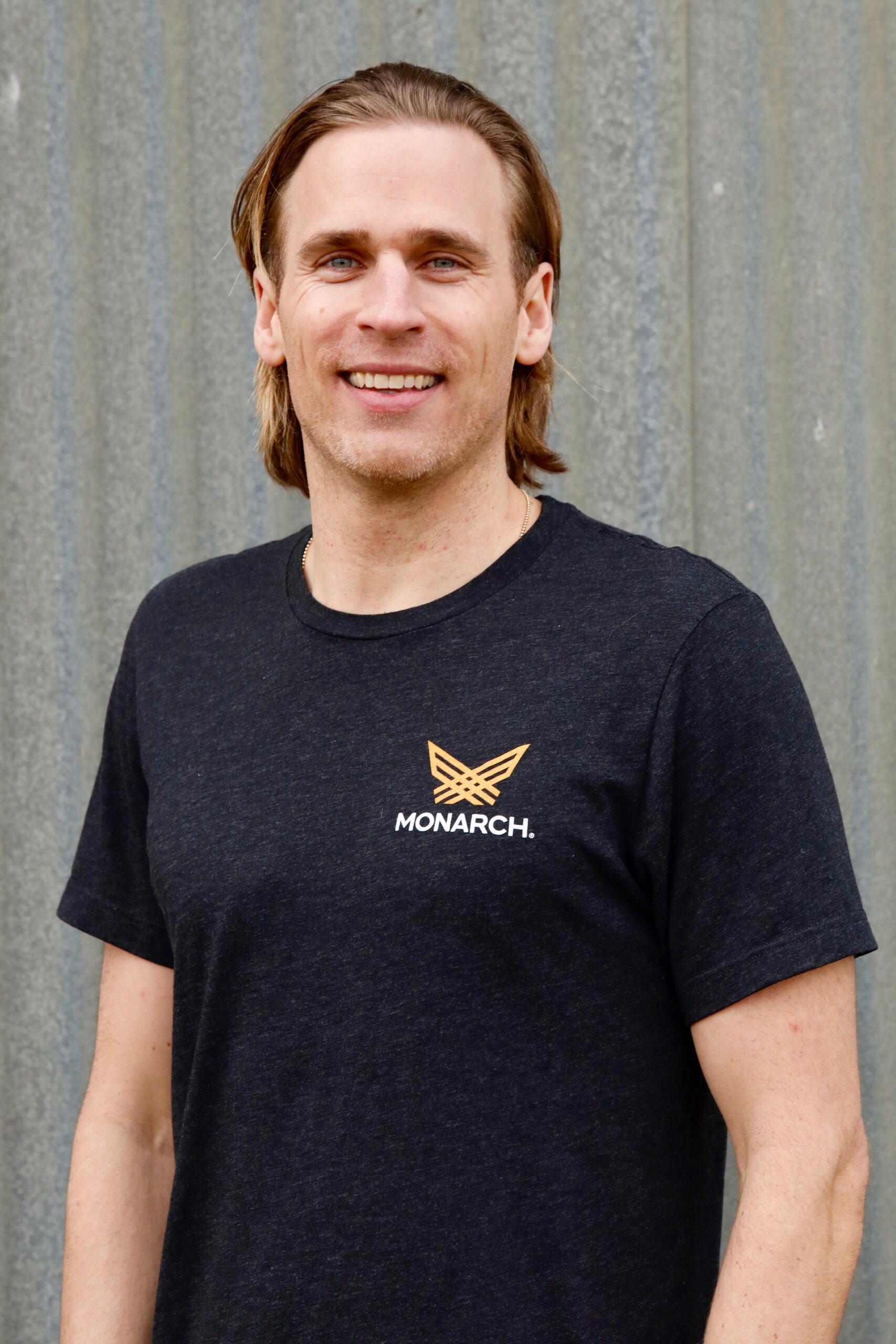
Carlo Mondavi- Guest, Chief Farming Officer Monarch Tractor
Carlo is Chief Farming Officer of Monarch Tractor. An expert viticulturist with experience in Organic, Biodynamic, and Permaculture Farming. He is a fourth generation winegrower from the world-renowned Mondavi family and is co-founder of Raen Winery, as well as a partner at Continuum Estate. Carlo is the co-founder of the Monarch Challenge, an effort focused on elevating farming by eliminating herbicides and powerful chemicals from farms in Sonoma, Napa and beyond. The Monarch Challenge is the namesake of Monarch Tractor.
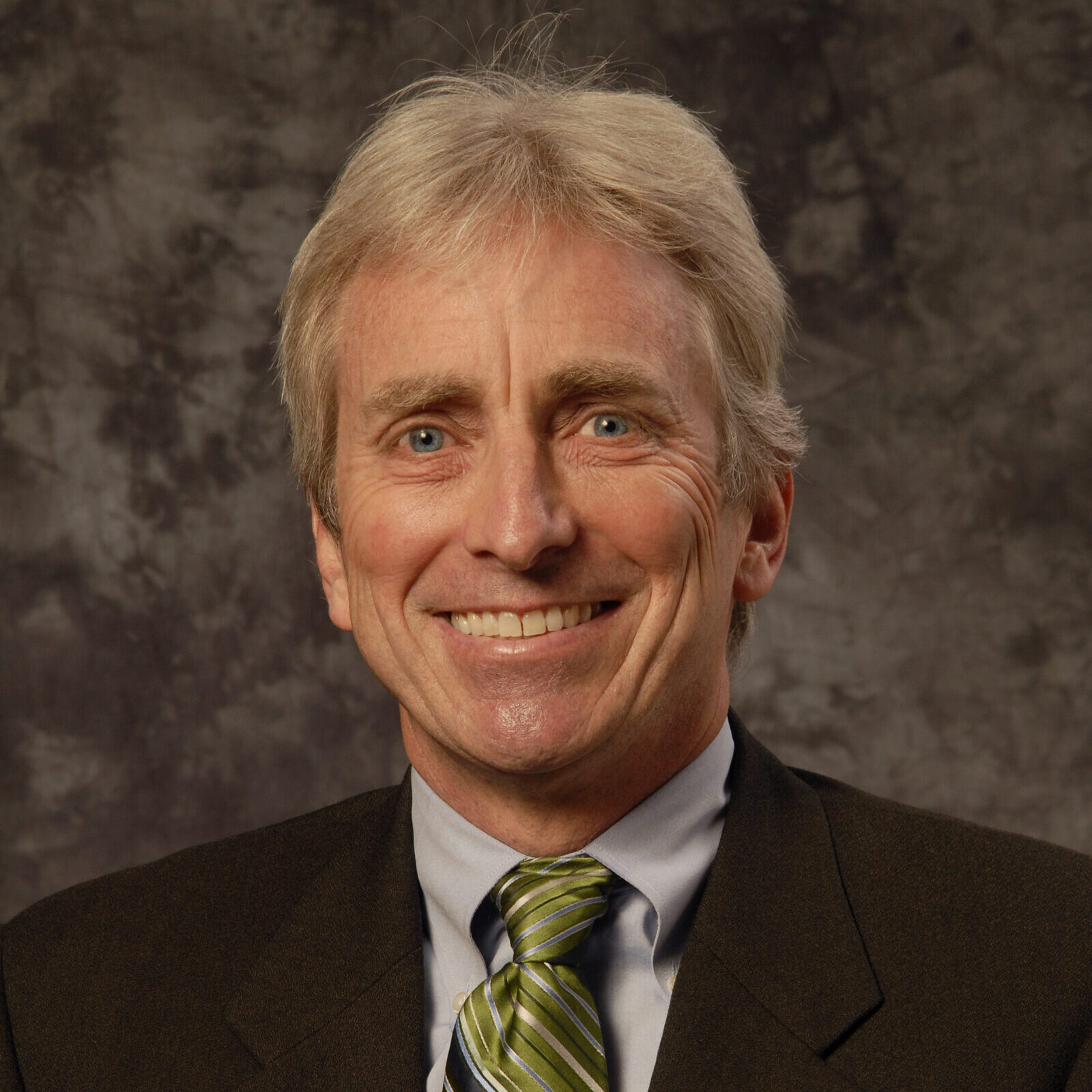
Ed Bernardon, Vice President Strategic Automotive Initiatives – Host
Ed is currently VP Strategic Automotive Initiatives at Siemens Digital Industries Software. Responsibilities include strategic planning and business development in areas of design of autonomous/connected vehicles, lightweight automotive structures and interiors. He is also responsible for Future Car thought leadership which includes hosting the Future Car Podcast and development of cross divisional projects. Previously he was a founding member of VISTAGY that developed light-weight structure and automotive interior design software acquired by Siemens in 2011, he previously directed the Automation and Design Technology Group at MIT Draper Laboratory. Ed holds an M.S. in mechanical engineering from MIT, B.S. in mechanical engineering from Purdue, and MBA from Butler.
If you like this Podcast, you might also like:
- Carlo Mondavi’s Autonomous Electric Tractors for Sustainable, Affordable Farming – Part 1
- The Next Leap for Electric Vehicles with Will Graylin, Indigo Technologies – Part 1
- Driving the Electric Car Revolution w/ Henrik Fisker of Fisker, Inc.
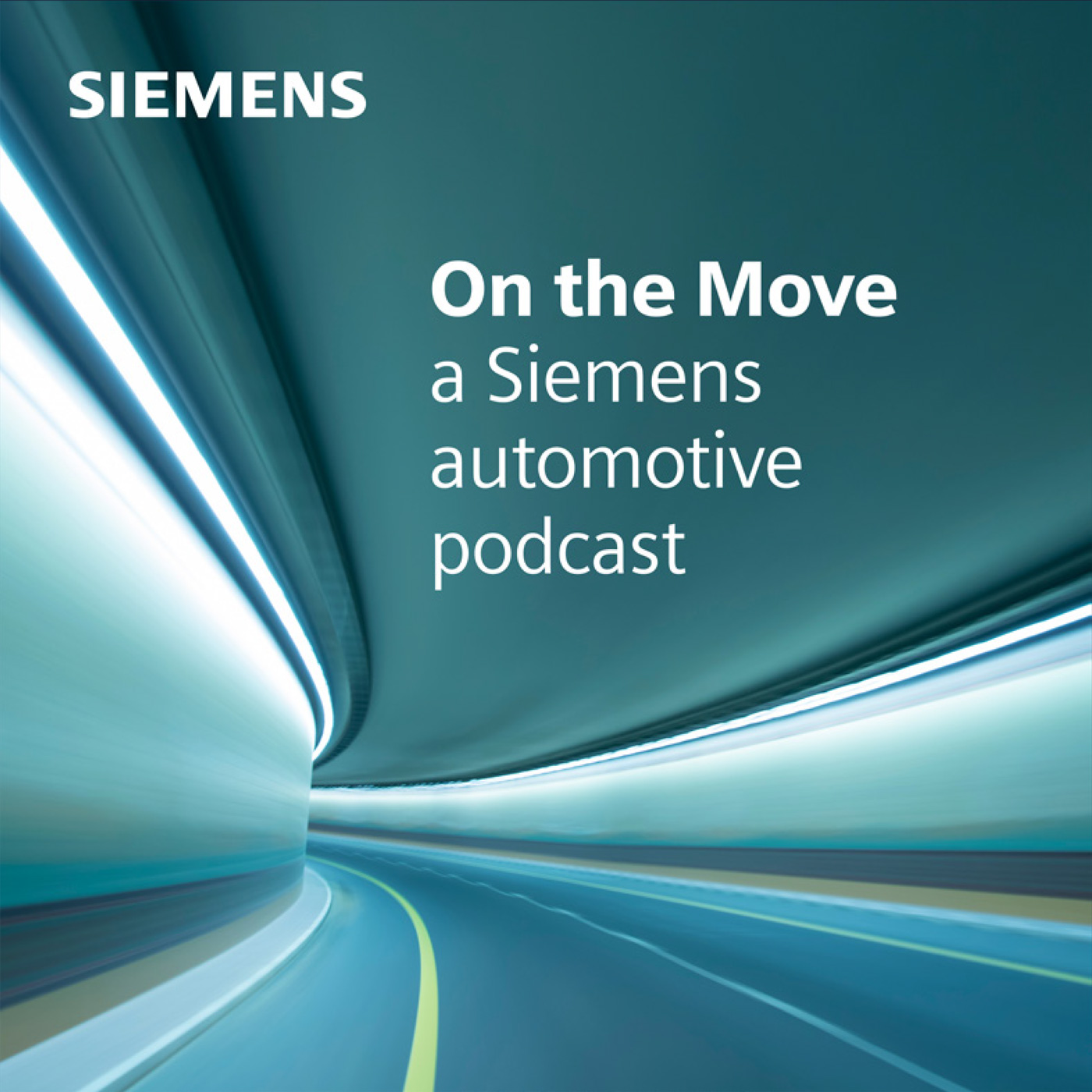
On the Move: A Siemens Automotive Podcast
The automotive and transportation industries are in the middle of a transformation in how vehicles are designed, made, and sold. Driven by an influx of new technologies, consumer demands, environmental pressures, and a changing workforce in factories and offices, automotive companies are pushing to reinvent fundamental aspects of their businesses. This includes developing more advanced and capable vehicles, identifying new revenue sources, improving customer experiences, and changing the ways in which features and functionality are built into vehicles.
Welcome to On the Move, a podcast from Siemens Digital Industries Software that will dive into the acceleration of mobility innovation amid unprecedented change in the automotive and transportation industries. Join hosts Nand Kochhar, VP of Automotive and Transportation, and Conor Peick, Automotive and Transportation Writer, as they dive into the shifting automotive landscape with expert guests from Siemens and around the industry. Tune in to learn about modern automotive design and engineering challenges, how software and electronics have grown in use and importance, and where the industries might be heading in the future.
